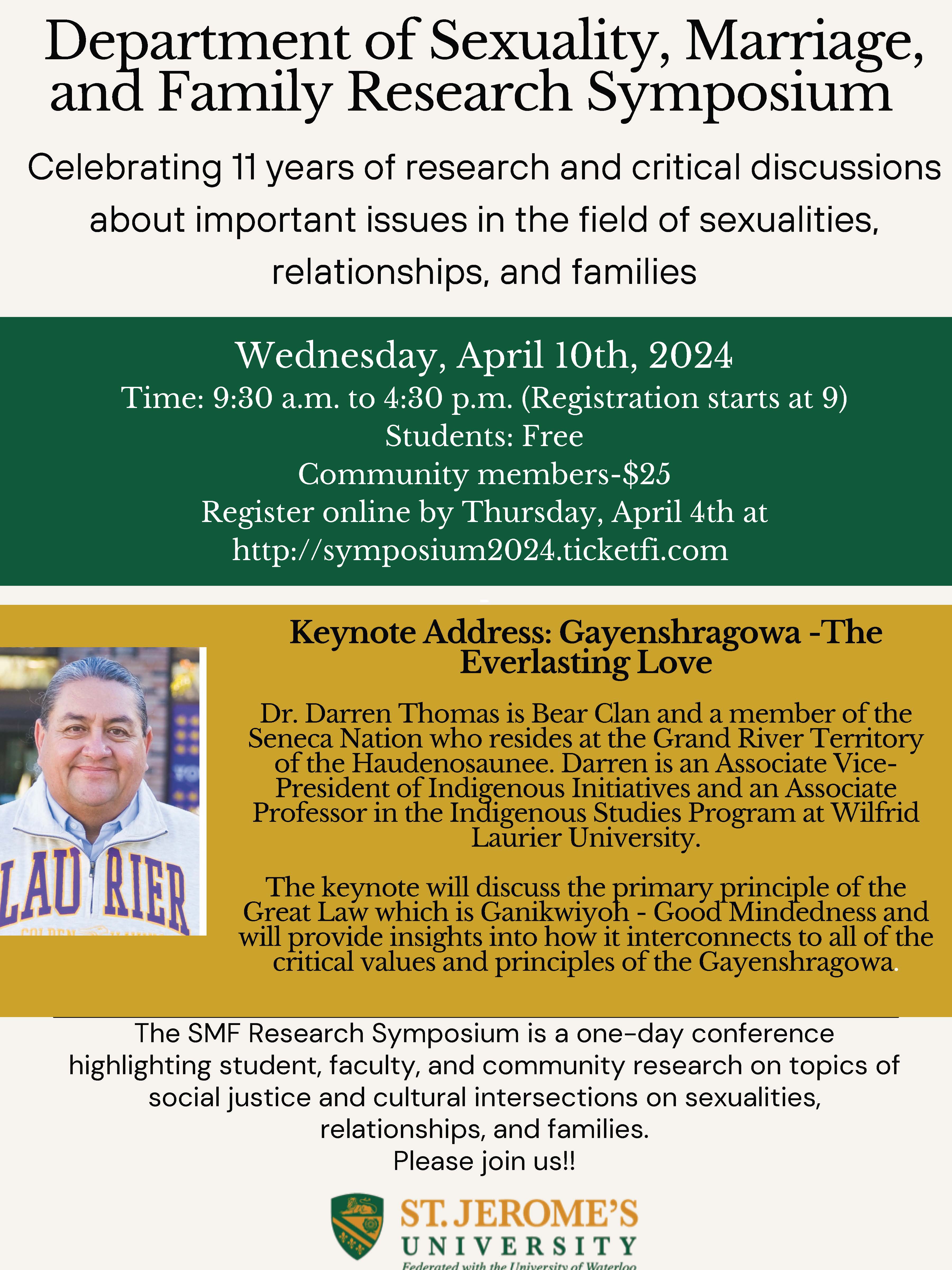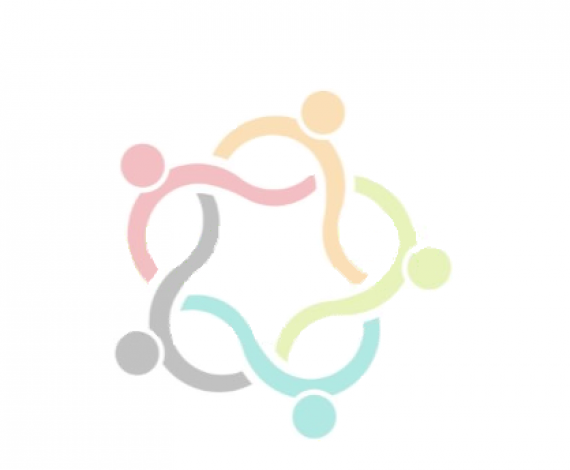The SMF Research Symposium is an annual conference hosted by the Department of Sexuality, Marriage, and Family Studies (SMF) at St. Jerome’s University in Waterloo, Ontario. The symposium is a one-day conference that highlights student and faculty research dealing generally with relationships, families, and human sexuality.
The Research Symposium was first launched by SMF faculty and students in 2009 to bring together an academic community of shared interests in scholarship and research. It is our hope that it will continue to serve as a forum for growth and development within the fields of sexuality, relationships, and families, as well as provide a space for future innovations and professional exploration. The SMF department encourages an overarching vision of social justice and anti-oppression through research and scholarship, and emphasizes the importance of that vision through the Research Symposium.
Each year, the SMF Symposium offers an opportunity for students, faculty, and community members to present their research and engage in critical discussions about important issues in the relationships and sexuality fields. These critical discussions often take on a practical or applied focus – how research translates into practice in the human services fields. The Symposium team remains committed to creating a venue where we can explore and discuss theory and research in critical and accessible ways!
The 11th Annual SMF Research Symposium will take place on Wednesday, April 10, 2024.
Click here to register for the Symposium!
KEYNOTE
Title: Gayenshragowa-The Everlasting Love
Abstract: The Hodinosoni/Haudenosaunee/Six Nations/Long House Builders are a confederacy of several Nations that came together under the principles of Peace, Power, and Righteousness. Prior to receiving a message of peace these Nations were all at war with one another. This wartime era is described as blood flowing freely upon the earth. During this hardship a Peacemaker was sent with a message of Gayenshragowa: The Great and Everlasting Love/the Great Law of Peace. The Great Law is a complex philosophy that establishes a set of “instructions” of how to live life as a good human being. The focus of this keynote will discuss the primary principle of the Great Law which is Ganikwiyoh-Good Mindedness and will provide insights into how it interconnects all of the critical values and principles of the Gayenshragowa. We will examine how these teachings helped construct Haudenosaunee citizenship which forms the foundation of Haudenosaunee Confederacy, how it informed diplomacy and treaty making prior to settlement and how it informed early Crown relations. Lastly, we will discuss how it inform us to live a peaceful, harmonious existence for the “Faces Yet to Come.”

Bio: Dr. Darren Thomas is Bear Clan and a member of the Seneca Nation who resides at the Grand River Territory of the Haudenosaunee. Darren is an Associate Vice-President of Indigenous Initiatives and an Associate Professor in the Indigenous Studies Program at Wilfrid Laurier University. As a senior leader of Indigenous Initiatives at Laurier, he manages a staff team that is responsible to support Indigenous students, staff, and faculty by developing and implementing an Indigenous strategic plan for Indigenization, decolonization, and reconciliation. Darren’s personal research interests are: Indigenous thought and philosophy, Indigenous community development, strengthening and improving Indigenous health and well-being, Indigenous law, and Indigenous rights and resource governance.
AGENDA
| Time |
Event |
Location |
| 9-9:20 a.m. |
Registration & Coffee |
SJ2 Atrium |
9:30-11 a.m.
60 min talk + 30 min Q&A |
Welcome
Keynote: Dr Darren Thomas: Gayenshragowa-The Everlasting Love |
SJ2 Room 1002 |
| 11-11:30 a.m. |
Morning Break
Coffee & Tea |
SJ2 Atrium |
| 11:30 a.m.-12:30 p.m. |
1. Emmi Doerr: Parenting with Disability: An Opportunity to Shift the Narrative
2. SMF 230 Stats Presentations |
SJ2 Room 1002 |
| 12:30-1:30 p.m. |
Lunch |
Served in the SJU Servery - Community Centre |
1:30-2:30 p.m.
20 min each (15 min + 5 min Q&A) |
1. Jayden Bousfield: Support Seeking for Gender Dysphoria in Intimate Relationships
2. James Kim: Investigating the Psychology of Incels and Misogynistic Ideologies of the Mansophere: A Mixed-Methods Approach
3. Abbi Longmire: Integrating Relationships in Research for Social Justice and Queer Liberation Informed by a Queer Activist Symposium |
SJ2 Room 1002 |
| 2:30-3p.m. |
Afternoon Break
Candy Bar |
SJ2 Atrium |
| 3-4 p.m. |
Dr. Katy Fulfer's panel with PhD students Belinda Alievska, Marco Tang, and Eric Devall: Re-conceiving pregnancy: Philosophical questions around miscarriage, abortion, and ectogenesis |
SJ2 Room 1002 |
| 4-4:30 p.m. |
1. Laura Grafton: Queering the Edge: Representation Politics in the Harley Quinn Franchise
2. Liam Gardner & Andrew Deman: Re-reading Historic Queer Manga: Heteronormativity in Moto Hagio’s The Heart of Thomas |
SJ2 Room 1002 |
ABSTRACTS
Parenting with Disability: An Opportunity to Shift the Narrative
Emmi Doerr
Parenthood is a complex, challenging endeavor that is difficult for all, but especially for parents with their own disability. This presentation examines the current, limited research on parents who have a disability. It examines the challenges and barriers, the coping strategies, and strengths of this unique experience. It challenges the widely held assumption that people with disabilities are not competent in parental roles, and looks at external factors that influence the experience and outcomes for both parents and children. This presentation makes recommendations for societal changes grounded in the concept of setting parents with disability up for a successful and supported parenting experience. My research addressed the questions: “How does the experience of parenthood differ for those who have pre-existing physical disabilities that they are aware of before becoming a parent?” and “How can society and policies enable parents with disabilities to fully and joyfully embrace their parenting role?”. The research currently indicates that a parent’s disability is related to positive outcomes for children by increasing empathy, responsibility, and resiliency. Any negative outcomes reported are due to societal oppression not the disability itself. However, society continues to assume that a parent with disability is incapable of raising a child without negative outcomes for both child and parent or extensive intervention by social support agencies. Understanding the parenting experience from the perspective of the parents themselves allows a more comprehensive analysis on what services are needed and which cause more harm.
Support Seeking for Gender Dysphoria in Intimate Relationships
Jayden Bousfield
There is an overall lack of research showing how individuals seek social support for gender dysphoria and how it may impact intimate relationships. The purpose of this study is to explore the experience and relational implications of gender dysphoria within an intimate relationship in which at least one partner experiences gender dysphoria. The objectives of this study are to 1) evaluate how individuals navigate gender dysphoria alone, with partner, and/or support their partner(s) in navigating gender dysphoria, and 2) to determine how this influences relational outcomes such as level of interdependence and satisfaction with giving and receiving care in the relationship. For this study, approximately five couples, with at least one partner self-identified as experiencing gender dysphoria, will partake in individual semi-structured interviews. A qualitative thematic analysis will then be done to organize, analyze, and identify themes and patterns within the interview data. Findings will help create further awareness of the need for extra-relational support for those experiencing gender dysphoria and bring attention to the possible connection between a lack of support for gender dysphoria and poor relational outcomes. This information is essential for developing effective resources for gender dysphoria and understanding its social implications.
Re-reading Historic Queer Manga: Heteronormativity in Moto Hagio’s The Heart of Thomas
Liam Gardner & Andrew Deman
Moto Hagio’s The Heart of Thomas holds a unique place in the history of queer representation in manga. Created in 1974, Hagio’s magnum opus is widely considered by Japanese and North American scholars as the foundational text of the boys-love genre (shonen ai) and a deeply important precursor to the wildly popular yaoi genre, defined by Nagaike as “female fantasies about idealized male homosexual relationships.” In light of this critical consensus, reading The Heart of Thomas as an innately heteronormative story rather than a truly queer one, holds the potential to unsettle our critical understanding of not just this text, but of its wide-reaching influence as a heralded queer manga touchstone. This team-taught presentation undertakes just such a process by drawing in critical queer theory through the lens of Wallace and Alexander’s concept of the “just like us” trope, which focuses on the “heteronormative erasure of queerness in literacy development” and the subsequent failure of culture (or specific aspects of culture) to “fully account for the complexities of queer lives and literate practices.” By analyzing The Heart of Thomas using these and other key frameworks - including a morphological description of queer narratives, a portrayal of heteronormativity through queer characters, and an analysis on the use of visual androgyny - it becomes increasingly clear that not only is The Heart of Thomas NOT a queer narrative, but that it was never intended to be one in the first place. As such, our counter-reading of this text within the discourse of queer manga opens new vistas for consideration and contemplation of the broader heteronormativity that is endemic to our processes of discursive and historical criticism.
Queering the Edge: Representation Politics in the Harley Quinn Franchise
Laura Grafton
Representation of marginalized communities is an important part of building the popularity of the DC Comics character Harley Quinn in all her media forms. Harley’s queerness has been a key part of her character since it was first implied in Batman the Animated Series (BTAS), and eventually brought to light in her canonical relationship with supervillain/anti-hero character, Poison Ivy. Additionally, representational politics have been a part of Harley’s journey as a survivor of domestic violence. This presentation will explore research that was a part of my undergrad thesis, which focused on the shift in the way in which Harley’s queerness has evolved from implicit and subtextual to explicit and confirmed in canon. Looking at the canonical representation of queerness alongside social media reception to the comics, tv shows and movies show us that despite growing acceptance for the queer community, bias still exists and potentially slows representational progression in the character - a conclusion that also manifests through the study of Harley Quinn Fan Fiction.
My presentation will discuss the importance of representation for sexual minorities and the increasing potential of this massive serialized collaborative fiction (MSCF) (Cook, 271) to push past mere representation and into the humanizing of these characters. Through the use of gaze and queer theory I’ll look at the ways that Harley's character has re-conceived what representing queerness and normalizing sexuality looks like.
This relationship has different canonical start dates. Though implied from the BTAS days, the canonical first kiss isn’t shared until issue 25 of the Rebirth run. Harley calls Ivy her girlfriend in issue 9 of the New 52 run, though largely this relationship is still implied but not confirmed in that run and both characters are seeing other people throughout.
Investigating the Psychology of Incels and Misogynistic Ideologies of the Manosphere: A Mixed-Methods Approach
James Kim
In this talk, I will first introduce my research background in relationship and sexuality science and provide a brief overview of the evolution of my scholarship from my initial interests as an undergraduate to my current role as a Provost Interdisciplinary Scholar at SJU/UW. Following this, I will detail some of my emerging research that explores the psychosocial correlates of incel identification and the sources and outcomes of incel-related aggression. I will describe the interdisciplinary frameworks and mixed methods I plan to use to situate misogynist incel ideology within the broader online ecosystem of the ‘manosphere’, and highlight how such insights can help identify key features underlying contemporary forms of misogyny. I will conclude by discussing the implications of this research for developing prevention, intervention, and educational strategies aimed at reducing the adoption of misogynistic ideologies, and how this work contributes to understanding the pathways through which misogyny in both online and offline spheres translates to gender-based violence and societal harms.
Integrating Relationships in Research for Social Justice and Queer Liberation informed by a Queer Activist Symposium
Abbi Longmire
This presentation will introduce participants to Queer Liberation Theory (QLT) as a structural and critical framework. Practical applications for action-oriented social work, including the building of solidarity within the Queer community will be shared.
An emerging QLT provides a framework to critically analyse the relationship between queerness and capitalism, and the implications for anti-capitalist movements. QLT seeks to reinvigorate the structural focus of the Gay/Queer liberation movement of the 1960s and 1970s, with insights gained from Queer theory applied to Queer subjectivities under neoliberal capitalism. Three QLT tenets have been identified: anti-assimilationism, solidarity across social movements, and the political economy of queerness. These tenants were discussed at the inaugural Queer Activist Symposium in May 2023. The goal of the Queer Activist Symposium was to: (1) Expand QLT as a means for the Queer movement to progress beyond identity formation and return to its earlier, liberationist form, and, (2) Evaluate QLT’s potential to build solidarity and reawaken the dormant Queer movement based on its practical application. The symposium was a free 2-day event that provided meals and overnight lodging at a university campus in Waterloo, Ontario. The event featured presentations by Canadian activists representing different social justice movements, including Black Lives Matter (Toronto Chapter) and O:se Kenhionhata:tie (a local Indigenous community group). Participants, presenters, and organizers shared in conversations highlighting diverse perspectives on Queer history, the applicability of QLT, and considerations for future mobilization of the Queer community. The symposium provided opportunities for knowledge sharing and theory development by and for the Queer community. Through conversations guided by QLT four new priorities emerged: access and diversity; decolonizing community and activism; crediting and centering marginalized voices, concepts, and history; and practical applications for future generations. These priorities may empower social workers to uproot exclusion, discrimination, and stigma in practice.
Re-conceiving pregnancy: Philosophical questions around miscarriage, abortion, and ectogenesis
Katy Fulfer with PhD students Belinda Alievska, Marco Tang, and Eric Devall
This panel presents research from PhD students in a philosophy course on reproductive ethics. Each presentation explores how social and political dimensions cannot be separated from conceptual analyses of experiences of pregnancy. Belinda Alievska and Marco Tang each examine proposals to replace ambiguous language used to describe miscarriage (e.g., “pregnancy loss”) with more descriptive language such as “intrauterine death” and “pre-term delivery.” The shift in language is encouraged for clinicians to lessen the potential for psychological harm around miscarriage. Alievska argues that language changes might have an unintended yet harmful outcome if “intrauterine death” is interpreted to infer personhood on fetuses, a view which may be co-opted by anti-abortion discourse to further restrict reproductive health care. Tang argues that the intended goal of the shift in language, which is to prevent psychological harm, is on its own insufficient and may in some instances be counterproductive. He offers various scripts that physicians might use to acknowledge grief more fully and to support people who have experienced miscarriage. Eric Devall examines the discourse around ectogenesis which focuses on full ectogenesis, an innovation which remains speculative, while also ignoring partial ectogenesis, which is a more immediate and likely technological innovation that could improve neonatal intensive care, and ignoring how the discourse tends to treat abortion as a moral problem to be solved. Devall diagnoses this discourse as privileging ideal theory, which abstracts from real-world experiences, over non-ideal theory, which is grounded in actual concerns. He then shows how the dominance of ideal theory has led to impasses in discussions on parental licensing. What weaves these presentations together is a call to embed philosophical analyses in social and political realities to promote more just worlds and outcomes for pregnant persons and prospective families. This panel will be moderated by Prof. Katy Fulfer.



